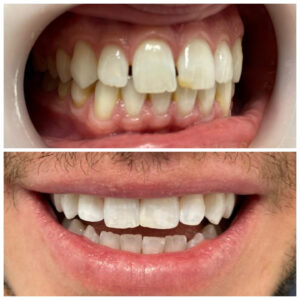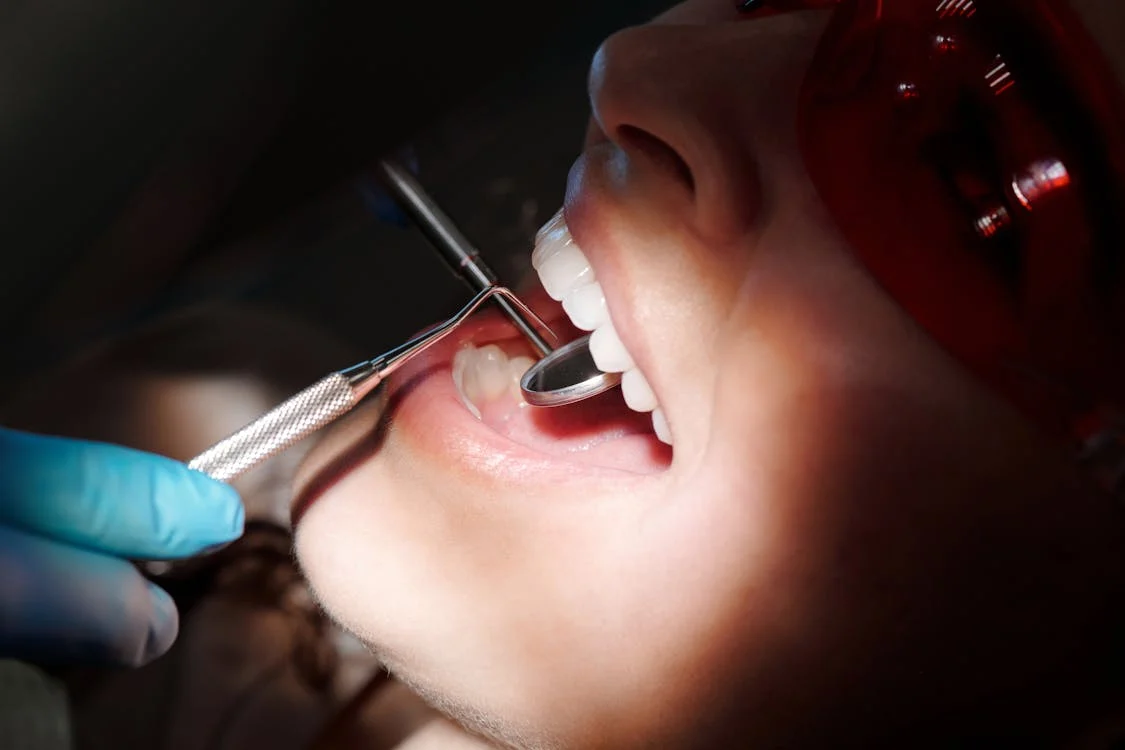If you want to perfect your natural smile, Composite Dental Bonding is a state-of-the-art treatment. This cost-effective solution is minimally invasive, quick and reversible for a revived and natural-looking smile.
Start today from £110 – £300 Per Tooth
What is Composite Bonding?
Composite Bonding (also known as dental bonding, or tooth bonding), is a versatile dental solution for minor damage or gaps in teeth. Typically, dental bonding is used for filling chips, fractures, and gaps in teeth or to fix discolouration of your natural teeth.
A tooth-coloured high-quality resin material is applied to a tooth and shaped to restore the tooth’s natural appearance. The material is then hardened with a special light to bond the material to the tooth. As a painless and quick procedure, the solution leaves you with a natural-looking smile.
Before and After

Is Composite Bonding for you?
Composite Bonding is a versatile dental solution that can transform your teeth and give you confidence in your new smile. We may recommend Composite Bonding as a solution for various cases, including:
- To repair decayed teeth (Composite resins are used to fill cavities)
- To repair chipped or cracked teeth
- To close spaces between teeth
- To protect a portion of the tooth’s root which is exposed
Composite Bonding can also be a solution for minor cosmetic imperfections that you may wish to have changed, including:
- To improve the appearance of discoloured teeth
- To make teeth look longer
- To change the shape of teeth
- As a cosmetic alternative to amalgam fillings
What are the Benefits of Composite Dental Bonding?
Dental Bonding is one of the easiest and least expensive cosmetic dental solutions. Unlike veneers and crowns, which are customised tooth coverings that must be manufactured in a lab, Dental Bonding can usually be done in one dentist visit unless several teeth are involved.
Advantages include:
- Our dentists can make cosmetic improvements to your smile quickly and effectively
- It is a versatile treatment that our dentists use to fix various cosmetic issues
- The Composite is hardened as soon as it’s applied, which means the tooth can comfortably bite down on the same day as the appointment and there is no recovery time
- Compared to Veneers and Crowns, Bonding is a non-invasive procedure with the least amount of tooth enamel removed
- Regular brushing and maintaining a good oral hygiene routine will ensure the treatment lasts for years before requiring any polish or repair.
How can Composite Bonding work with Teeth Whitening
As a versatile cosmetic solution, Composite Bonding can also be an effective solution for stained teeth and fillings. Composite Bonding also works well alongside Teeth Whitening treatments, as the composite resin can be shade-matched to your whitened teeth for a brighter smile.
Our dentists recommend starting whitening treatment first. Once your teeth are at a preferred shade, begin the Composite Bonding treatment so that the shade can be matched.
Composite Bonding FAQs
Dental bonding is an option that can be considered:
- To repair decayed teeth (composite resins are used to fill cavities)
- To repair chipped or cracked teeth
- To improve the appearance of discoloured teeth
- To close spaces between teeth
- To make teeth look longer
- To change the shape of teeth
- As a cosmetic alternative to amalgam fillings
- To protect a portion of the tooth’s root that has been exposed when gums recede.
Preparation: Little preparation is needed for dental bonding. Anaesthesia is often not necessary unless the bonding is being used to fill a decayed tooth, the tooth needs to be drilled to change its shape, or the chip is near the nerve. Your dentist will use a shade guide to select a composite resin colour that will closely match the colour of your tooth.
The bonding process: Next, the surface of the tooth will be roughened and a conditioning liquid applied. These procedures help the bonding material adhere to the tooth. The tooth-coloured, putty-like resin is then applied, moulded, and smoothed to the desired shape. A bright, usually blue, light, or laser is then used to harden the material. After the material is hardened, your dentist will further trim and shape it and polish it to match the sheen of the rest of the tooth surface.
Time-to-completion: Dental bonding takes about 30 to 60 minutes per tooth to complete.
Bonded teeth do not require special care. Simply follow good oral hygiene practices. Brush teeth at least twice a day, floss at least once a day, rinse with an antiseptic mouthwash once or twice a day and see your dentist for regular professional check-ups and cleanings.
Because bonding material can chip, it is important to avoid such habits as biting fingernails; chewing on pens, ice, or other hard food objects; or using your bonded teeth as an opener. If you do notice any sharp edges on a bonded tooth or if your tooth feels odd when you bite down, call your dentist.
Alternatives to composite bonding include:
Veneers are thin porcelain mouldings that are bonded to a tooth’s front surface. In cases where orthodontic treatment is not possible, they can be used to cover gaps in teeth.
Crowns cover the entire visible portion of your tooth with a tooth-shaped cap. Your crown will feel and function just like any other tooth. The porcelain crown will be virtually indistinguishable from your other teeth if you choose to have one.


